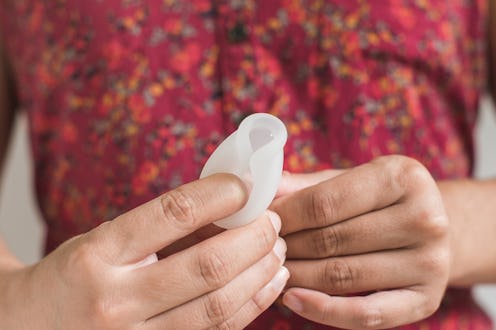Life
7 Pad, Tampon, & Menstrual Cup Mistakes OBGYNs Want You To Know About

Considering that, if you’re a person with a menstrual cycle, and you live in an industrialized country, you can expect to get about 480 periods total in your lifetime, you’d think you’d have this process perfected by now. Well, as it turns out, you might be making some mistakes when it comes to using your pads, tampons, or menstrual cup, even if you've been using them for freaking ever. There are some things that your gynecologist really wishes you’d just stop doing already.
“The average woman uses about 10,000 pads or tampons in her lifetime,” Dr. Julie Lamb, MD, reproductive endocrinologist and infertility specialist at Pacific NW Fertility in Seattle, tells Bustle via email. “So, there is actually some research about menstrual management methods,” she says.
Because there has, until very, very recently, been such a strong stigma around our menstrual cycles, it's possible that many of us mess up our period management routine without even knowing it. Though toxic shock syndrome is thankfully a lot rarer than your seventh grade health class probably led you to believe, subtle things like leaving a tampon in for too long, or not avoiding certain ingredients, can make a difference in your health. Making sure that you’re practicing good menstrual health hygiene is important.
Here are seven mistakes you might be making when managing your period, and how to make sure your menstrual self-care is safe and on point.
1Leaving Your Tampon In Too Long
"It's recommended to change [your tampon] at least every four to eight hours to minimize your risk of TSS," Dr. Lamb says, and definitely don't use one between periods.
According to the Mayo Clinic, TSS is a rare, though potentially life-threatening, bacterial infection. Symptoms include fever, confusion, and headaches. Leaving your tampon in for too long can encourage harmful bacteria to grow, so correct tampon use is crucial to keeping your risk for TSS and other infections down.
2Using The Wrong Size Tampon
There is also a link between using too-absorbent tampons and TSS, says Dr. Lamb. In order to minimize your risk of (TSS), it's important to use the lightest absorbency that you can for your flow, while changing your tampon frequently enough.
TSS has been associated with some super absorbent tampons, according to the Mayo Clinic, but incidences of the illness have declined as manufacturers have pulled certain types of tampons from the market.
3Not Changing Your Pad Often Enough
Dr. Adeeti Gupta, founder of Walk In GYN Care tells Bustle via email that it's important not to wear pads and liners when you don't need them, and change them frequently when you do. Prolonged or "unnecessary use of pads and panty liners can cause serious irritation of the vulva, and cause some long-term skin conditions," she says.
Verywell Health recommends changing your pad every six hours during the day. If you wear a pad overnight, make sure to change it as soon as you wake up.
4Using A Menstrual Cup Incorrectly
According to Romper, using the right size menstrual cup for your flow, keeping it clean, and taking the time to learn to insert it properly, are key to getting this method down. "Anyone who has used a tampon should be able to easily fold the cup, and insert it toward the back of the vagina with a little push," Dr. Lamb says. "If it's in the correct place, you should barely be able to feel it." Dr. Lamb notes that if you have a latex allergy, you'll need to make sure to choose a silicone cup to avoid allergic reactions.
5Using Pads With Synthetic Liners
"Avoid wearing pads with synthetic liners, and use natural cotton-covered pads," in order to avoid potential skin irritation, rashes, and allergic reactions, says Dr. Gupta.
6Using Scented Pads & Tampons
Dr. Gupta also notes that using scented tampons and pads is a major menstrual hygiene mistake: They can cause irritation, and even severe allergic reactions in some people.
7Skipping Exercise On Your Period
"The most common mistake I see is stopping your normal exercise routine during menstruation," says Dr. Lamb. The stress-relief and endorphin rush that exercise provides can help with moods and pain during your period.
8
While your monthly menstrual cycle can seem like a lot of work, taking good care of yourself with good menstrual hygiene is a key form of preventive health care. Reducing your risk of infections and illness, while staying comfortable on your period, is totally worth the effort.